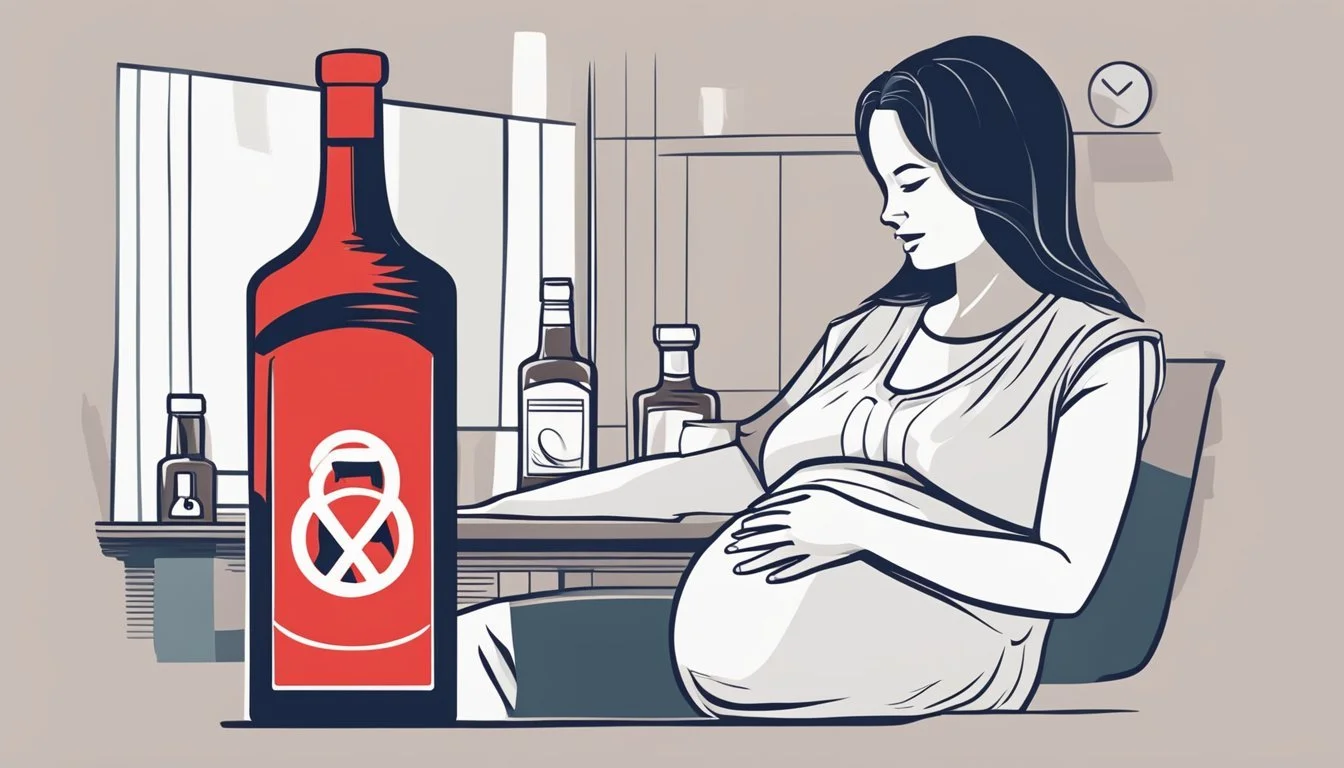Can Pregnant Women Drink Alcohol?
Exploring the Health Risks
The consumption of alcohol during pregnancy is a topic of significant concern and debate. Medical guidelines are clear on the subject: no amount of alcohol is considered safe for pregnant women. The risks associated with drinking alcohol during pregnancy include miscarriage, preterm birth, stillbirth, and a range of lifelong disabilities categorized under fetal alcohol spectrum disorders (FASDs). These disorders encompass a variety of physical, behavioral, and intellectual disabilities that can have profound impacts on an individual's life.
When alcohol is consumed during pregnancy, it can pass freely through the placenta to the developing fetus. The fetus, lacking a fully developed liver, cannot process alcohol as an adult can, leading to heightened exposure and potential harm. Among the spectrum of possible effects, fetal alcohol syndrome (FAS) is one of the most severe outcomes, characterized by growth deficiency, facial anomalies, and central nervous system dysfunction.
Despite the known risks, the prevalence and social attitudes towards drinking alcohol during pregnancy can vary. Some individuals may receive mixed messages about the safety of light or occasional drinking. Nevertheless, health authorities and research consistently advise complete abstinence from alcohol during pregnancy to ensure the safety and well-being of the unborn child.
Effects of Alcohol on Pregnancy
Pregnant women are advised to avoid alcohol as it poses significant risks to the development and health of the fetus. The varying intensities of alcohol consumption can lead to a spectrum of negative outcomes, each with lasting implications.
Fetal Alcohol Spectrum Disorders (FASD)
Fetal Alcohol Spectrum Disorders (FASD) encompass a range of effects that can occur in an individual whose mother drank alcohol during pregnancy. The severity of FASD can vary, but it might include abnormal facial features, growth deficiencies, and central nervous system problems. Fetal Alcohol Syndrome (FAS) is the most severe form of FASD, characterized by distinct facial abnormalities, growth retardation, and permanent brain damage.
Miscarriage and Stillbirth
Alcohol consumption during pregnancy is linked to an elevated risk of miscarriage, where a pregnancy ends on its own within the first 20 weeks of gestation. Stillbirth, the loss of a pregnancy after 20 weeks, is also a more severe risk associated with prenatal alcohol exposure.
Developmental Problems
Prenatal alcohol exposure can severely affect a fetus's development. It may lead to learning disabilities, speech and language delays, and a host of developmental problems that can impact a child's ability to function effectively in daily life. Additionally, issues with memory and increased risks for conditions like Sudden Infant Death Syndrome (SIDS) have been observed.
Risks of Light and Heavy Drinking
Light Drinking: The term 'light drinking' is ambiguous, and no safe amount of alcohol during pregnancy has been established. Even at low levels, alcohol may still pose a risk to fetal development.
Heavy Drinking: The risks dramatically increase with heavy alcohol use, including binge drinking. Heavy drinking during pregnancy can lead to more pronounced cases of FASD, low birthweight, and premature birth.
drinking any amount of alcohol during all stages of pregnancy is considered unsafe and can have harmful effects on the fetus.
Medical Guidance on Alcohol Consumption
The consensus among medical experts is clear: no amount of alcohol is considered safe for consumption during pregnancy. The following medical authorities provide specific guidance to ensure the health and safety of both the mother and the developing fetus.
American College of Obstetricians and Gynecologists
The American College of Obstetricians and Gynecologists (ACOG) strongly advises pregnant individuals to abstain from alcohol. They emphasize that alcohol can lead to significant fetal harm and long-term developmental issues for the child. Doctors and healthcare providers recommend complete avoidance of alcohol as the safest option for the health of the baby.
American Academy of Pediatrics
Similarly, the American Academy of Pediatrics underscores the stance that no amount of alcohol is safe during any stage of pregnancy. This pediatric authority alerts healthcare professionals to the potential risks, which include a range of fetal alcohol spectrum disorders (FASDs), and advocates for strict abstinence from alcohol throughout pregnancy.
Surgeon General's Advisory
Following the guidance, the Surgeon General's Advisory has issued statements informing the public of the importance of avoiding alcohol while pregnant. The Surgeon General advises individuals who are or might become pregnant to abstain from alcohol, reiterating the message that there is no known safe level of alcohol consumption during pregnancy.
Alcohol Consumption Behavior During Pregnancy
Pregnancy is a critical period where alcohol consumption can have serious implications for the health of both mother and child. Understanding the patterns of alcohol use and the support mechanisms available is essential for mitigating risks.
Understanding Alcohol Use
Alcohol use during pregnancy can lead to a range of developmental issues for the fetus, including Fetal Alcohol Spectrum Disorders (FASD). It is widely recognized that no amount of alcohol is safe for consumption during this time.
Risky Drinking Patterns
Risky drinking patterns, such as binge drinking—defined for women as consuming four or more drinks on a single occasion—can disrupt fetal development at any stage. Studies have identified that a percentage of pregnant women report alcohol use, posing risks of low birthweight and behavioral problems.
Alcoholics Anonymous and Recovery Support
Alcoholics Anonymous (AA) is a well-known support group for individuals, including pregnant women, seeking to address alcohol dependency. Recovery support networks are crucial for those looking to reduce alcohol use and maintain sobriety throughout pregnancy.
National Institute on Alcohol Abuse and Alcoholism (NIAAA)
The NIAAA promotes understanding of alcohol's impact during pregnancy and supports mothers through resources like the NIAAA Alcohol Treatment Navigator. This tool guides individuals, including pregnant women, in finding tailored alcohol treatment options.
Preventive Measures and Treatment
Pregnancy and alcohol consumption are a critical combination where preventive strategies and targeted treatment can mitigate the risk to both mother and child. This section focuses on identifying safe practices to prevent alcohol-related harms, treatment options for alcohol dependence, and available resources that support pregnant women.
Identifying Safe Practices
The standout rule for alcohol consumption during pregnancy is that there is no known safe amount. Pregnant women are advised to abstain from all forms of liquor, as even small amounts can increase the risk for problems such as alcohol-related neurodevelopmental disorder, and issues with vision and hearing. Routine prenatal checkups are essential to screen for any alcohol consumption and to educate about the risks associated with drinking during pregnancy.
Treatment for Alcohol Dependence
When a pregnant woman is struggling with alcohol dependence, immediate treatment is vital. Treatments tailored for pregnant individuals may involve a combination of therapy and support groups like Alcoholics Anonymous. Medical professionals can help with quitting drinking, a crucial step to reduce the risk of fetal alcohol spectrum disorders. It should be impressed upon individuals that there is no safe period for drinking during pregnancy, and this includes breastfeeding, as alcohol can pass through to the infant.
Resources for Pregnant Women
A wide array of resources is available to assist pregnant women with quitting drinking during pregnancy. These include specialized prenatal programs, counseling services, and community support systems. Women can access:
Treatment programs: Specialized for pregnancy-related substance use.
Support groups: Like Alcoholics Anonymous, specifically aimed at pregnant women.
Educational materials: Focused on the risks and the importance of abstaining from alcohol during pregnancy.
Utilizing these resources can offer the guidance, support, and information necessary to navigate a safe and healthy pregnancy.
Conclusion
During pregnancy, consuming alcohol poses significant risks to the developing fetus. The Centers for Disease Control and Prevention (CDC) and the National Institute on Alcohol Abuse and Alcoholism (NIAAA) both affirm that no amount of alcohol is considered safe at any time during pregnancy. The potential consequences include a range of Fetal Alcohol Spectrum Disorders (FASD), characterized by physical, behavioral, and learning problems.
The crux of medical consensus underscores that abstinence from alcohol is crucial during pregnancy. Here's a snapshot of essential points:
Alcohol Consumption: Any amount can be harmful.
FASD: Includes conditions such as fetal alcohol syndrome and can result in lifelong impairment.
Guidance from Experts: Unanimous advice from healthcare providers to refrain from alcohol.
Should a woman have concerns about alcohol use during pregnancy, she is strongly encouraged to consult with her healthcare provider. It is imperative to prioritize informed choices that safeguard the health and well-being of both the mother and the fetus.
In sum, the intersection of alcohol and pregnancy is one that necessitates clear, mindful approaches backed by research and medical expertise. The commitment to alcohol-free pregnancy is the safest path, concluding resoundingly in the interest of optimal pre-natal health.




